Riley Keough on Bringing Humanity to the Tragic Story in ‘Under the Bridge’ Finale
- Oops!Something went wrong.Please try again later.
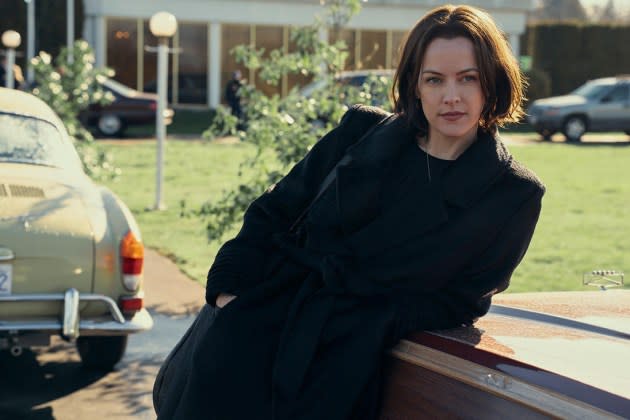
[This story contains major spoilers from the Under the Bridge finale, “Mercy Alone.”]
The final episode of Under the Bridge saw the complete, real-life events come to light around the night Reena Virk (played by Vritika Gupta in the series) was killed in Saanich, British Columbia by a group of teenagers. She was 14 when she first disappeared in 1997.
More from The Hollywood Reporter
The first few minutes of “Mercy Alone,” the eighth episode in Hulu’s true-crime limited series based on Rebecca Godfrey’s 2005 book, begin with Kelly Ellard (Izzy G.) talking explicitly to Josephine (Chloe Guidry) about wanting to break Reena’s bones with a bat, burn her at the stake and bury her alive in the forest. Kelly’s mom, who is in the room, does not even flinch at her daughter threatening to kill someone in such detail.
Following Warren Glowatski’s (Javon Walton) life sentence in the penultimate episode for his partial involvement in Reena’s death, Kelly’s trial then finally arrives in Canada.
Over the course of the hourlong finale, Rebecca, who is played by Riley Keough, struggles to come to terms with Warren’s secrecy surrounding that night. Reena’s mom, Suman (Archie Panjabi), forgives Warren for his involvement, leading him to testify at Kelly’s trial, revealing she ultimately held Reena’s head underwater and drowned her. During her cross-examination on the stand, Kelly shouts that she did not kill Reena and will state that for the rest of her life.
Despite the jury finding Kelly guilty of second-degree murder, similar to Warren, the judge ultimately gives her the minimum sentence of five years, citing her good grades in school and diverse network of family and friends.
The end cards of the finale then share what happened to the real-life group nicknamed the “Shoreline Six,” the remaining four of whom beat Reena to death and whose sentences varied from a 60-day custodial stay to one year.
Jo went on to be an exotic dancer after serving a year in juvie following two escape attempts. Dusty Pace (Aiyana Goodfellow) is one of the only ones who expressed regret about what happened, once saying the teens were “monsters” and should have gotten more time than they did. Warren devoted his life to restorative justice and was granted parole in 2010 after Suman and Manjit Virk (Ezra Faroque Khan) advocated for his release. He and Under the Bridge author Godfrey stayed in touch for over 20 years.
Kelly appealed and was granted two additional trials before being sentenced to life in a legal battle that spanned over a decade. She finally took responsibility for her hand in Reena’s death in 2016 while seeking day parole, which is a release under Canadian law that permits inmates to leave the prison during the day and return there or to a halfway house every night. She has two children.
Below, Under the Bridge star and producer Keough opens up about bringing humanity to true crime, approaching Reena’s story with sensitivity (as Elvis Presley’s granddaughter, she is familiar with people telling stories about her famous family), and balancing the real events with the series’ fictional aspects.
***
What initially drew you to the role of playing Under the Bridge author Rebecca Godfrey?
I was drawn to the project as a whole because I found my initial conversation with [showrunners] Quinn [Shephard] and Samir [Mehta] about the story, about the plan for it holistically, to be inspiring. I thought Reena’s story, first and foremost, was a story I wanted to honor. I thought the way they planned to handle her as a character and as a human being was really different to what I’ve seen in the true-crime genre. And I found Rebecca’s character to be really interesting because she is representing the way a lot of people feel. She’s kind of inserted herself in this situation, and I think in the beginning, you don’t know why and maybe it feels exploitive, and maybe it feels like she’s found this story that she’s using to be inspired to write her book, but I think that ultimately she’s going through her own personal journey that I don’t think she quite understands.
She’s even confronted by her father and by Cam [Lily Gladstone], who were kind of like, “What is your agenda here?” And the complexity of that was really interesting to me, figuring out all of the different factors coming into play. Ultimately, it feels as though sometimes she is being a bit reckless and inserting herself in a situation recklessly, which is very common in storytelling, and especially in exploitive storytelling. But I feel that she was searching for a more profound empathy and understanding of human beings and human behavior. And I think that there’s a psychological aspect to it for her, of wanting to define the humanity in something that felt so monstrous, demonic and horrific.
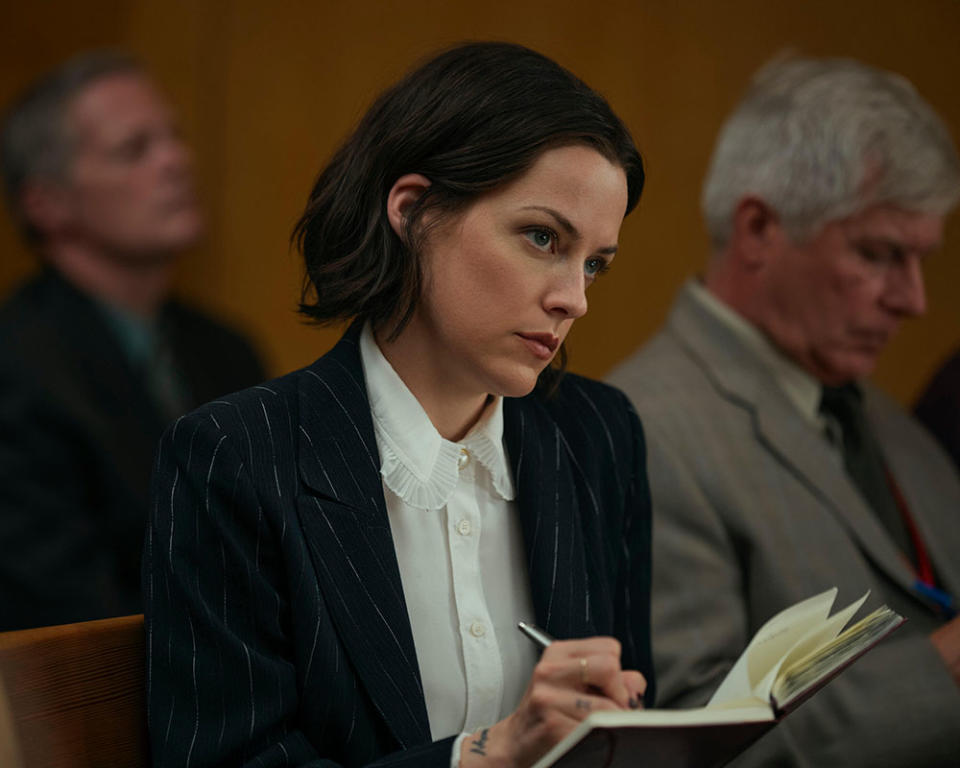
While your version of Rebecca is mostly fictionalized, how did you prepare to play someone who’s loosely based on a real person?
I was really lucky to have Quinn, because Quinn had spent a lot of years with Rebecca, so she was such an asset and knew everything about her. She was able to tell me how long she smoked cigarettes for, all these little details. I knew that Rebecca had wanted me to play her, which was really liberating. I felt a sense of freedom. I felt like she was the kind of person who would want me to make the character my own. I felt that freedom from her, and I know that she wasn’t concerned about the character always being likable, and I think she was OK with her existing in this sort of gray area. Quinn told me that, and that was something I really admired about her.
What’s so great about the show is, because it’s ensemble, you get all these different perspectives of this incident. You’re seeing it through these people’s eyes, who all have their own personal life experiences. So you’re really able to get different perspectives. In true crime, as a whole, typically it can be very black and white, and that’s something I’m really proud of with the show. Everyone feels like a human being, and like they’re bringing their own insight and baggage to the situation.
The story is based on a true story but is fictionalized for TV — it’s not a straightforward docuseries. How did you balance the fiction with the real elements?
The details pertaining to the incident itself was not fictionalized. There are characters who are amalgamations of different people and, of course, the relationship between Cam [Gladstone] and Rebecca was fictionalized. But as far as the way the story was handled, it’s actually very delicately handled, and they had the story. They had a lot of source material. There was Rebecca’s book and also [Manjit] Virk’s book [Reena: A Father’s Story]. So, they worked very hard to get a lot of these details correct.
I think the things that were fictionalized were just to support the storytelling, so you’re able to look at the situation through [other perspectives]. For me, the biggest fictionalization would be Cam as a character. You’re able to really see that different perspective through her eyes. I think it was really important to not just be looking at this case through Rebecca’s eyes, because she’s only one perspective. So Cam was created for that reason, and I think it’s really effective.
It just helps to explore this incident, seeing it through the eyes of two totally different women with totally different life experiences. You’re seeing it through the eyes of an Indigenous woman, who’s a police officer, and then a local Canadian woman, who’s a novelist. Then, within that, they have a [romantic] relationship, which also allows you to explore it with empathy, so it’s not like they’re rivals and you have to pick a side. I think that was what was so special about it. Because there’s a relationship there, you’re able to have moments of understanding both of them.
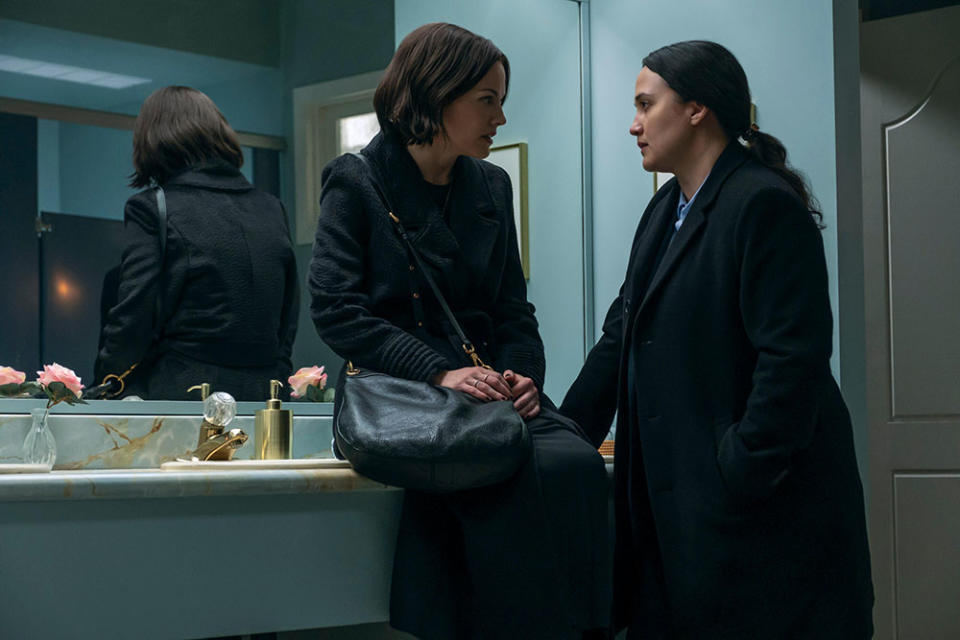
Lily Gladstone has previously talked about how your involvement in the series as her co-star and a producer made her want to be in it, despite her initially being a hesitant about doing another true-crime project after Killers of the Flower Moon. What was it like working opposite her?
I’m such a fan of hers as a performer, but I also respect her so much as a human being. I felt so lucky to have the opportunity to work with her. I’d been a fan of hers for a lot of years, and we had a little relationship on Instagram and would kind of DM each other sometimes. And I think that I am very supportive of Indigenous representation. That’s something I care a lot about, and obviously, so does she. I think that having an Indigenous character in this story was extremely important, especially in Canada. It felt very silly to have a Canadian story without an Indigenous voice. I also knew she would make it her own, and I knew the creators of the show would allow her to contribute in that way and respect her take on the character, and so all of it just felt collaborative and right to me.
Over the course of Under the Bridge, we see Rebecca sympathizing with Warren and not wanting one horrible choice he made in his life to define him. Can you talk about your kinship with Javon Walton in shooting these scenes and what you hope to get across with their unexpected bond?
When you’re dealing with kids, it’s a real opportunity to have empathy. With adults, people are quicker to have judgment. I think when you’re looking at children, the idea of forgiveness is easier. That’s an opportunity I was interested in. Not all individuals are the same, not all incidents are the same, not all people’s lives have been the same. And so I think that individualizing this was something I found interesting. It allowed us to have conversations. When I see the response to the episode, some people are feeling irritated by Rebecca and Warren’s relationship; some people are touched by it, and I think that all of that is valid.
Ultimately, the idea of this relationship with Warren comes from, of course, the fact that Rebecca in real life had a relationship with Warren, but it also comes from Suman forgiving him. We were working back from that concept, because that’s so radical and, strangely, happens all the time with prisoners on death row. It’s not uncommon that the relatives of a murdered individual end up having a relationship with the convicted inmate. It’s really common. So, that concept was a big conversation starter for us in the making of the show — radical forgiveness and what that looks like. Rebecca is the character that allows us to explore that idea with Warren.
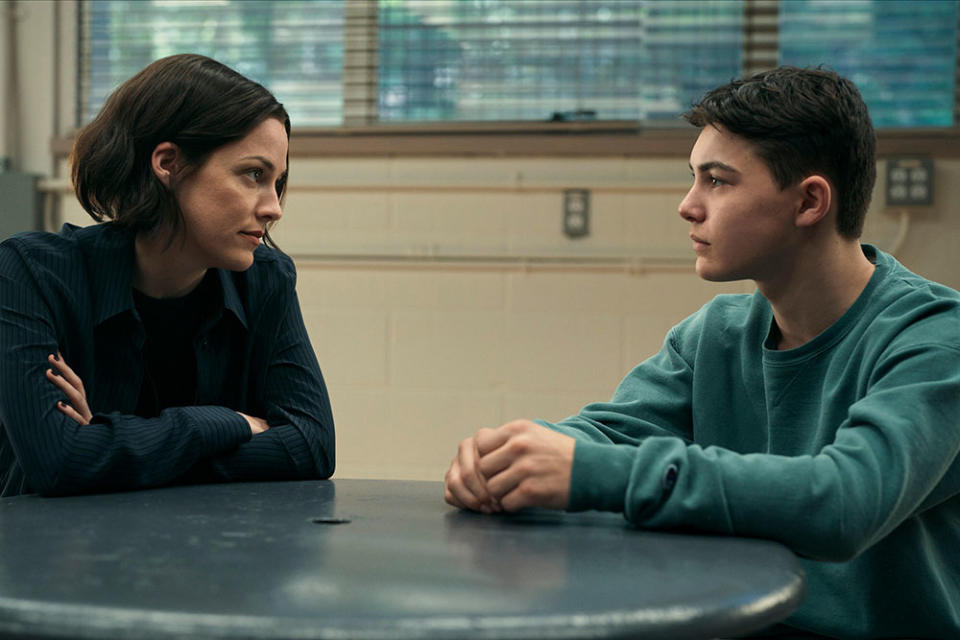
Some actors will play on things that have happened in their own lives for their roles. Did you take any sort of inspiration from your own life for Rebecca?
I typically don’t take my own stuff and put it into my roles, because I try and have empathy for the character and it’s actually more effective for me to have a feel for the person I’m being as opposed to my own stuff. But the one thing I do have experience with is that I have had friendships and relationships with people who have been convicted of crimes. And I have had experience with inmates and done a little bit of prison reform work, and I think those experiences really informed me as a human being, but also just my perspective on these things, which informed Rebecca’s.
How do you think Reena’s willingness to lose everything, including her family, for these girls who treated her so poorly speaks to teenage culture?
Teenagers are living in the moment. The wisdom of patience and outcome and cause and effect — I’m only understanding these things in my 30s. When you’re a teenager, it’s like, “All I care about is right this second.” And the fallout of your actions, that’s part of being a teenager, you’re starting to learn these things. That’s just how teenagers are. They’re living without thinking of the future and repercussions, really, and how things might affect their lives.
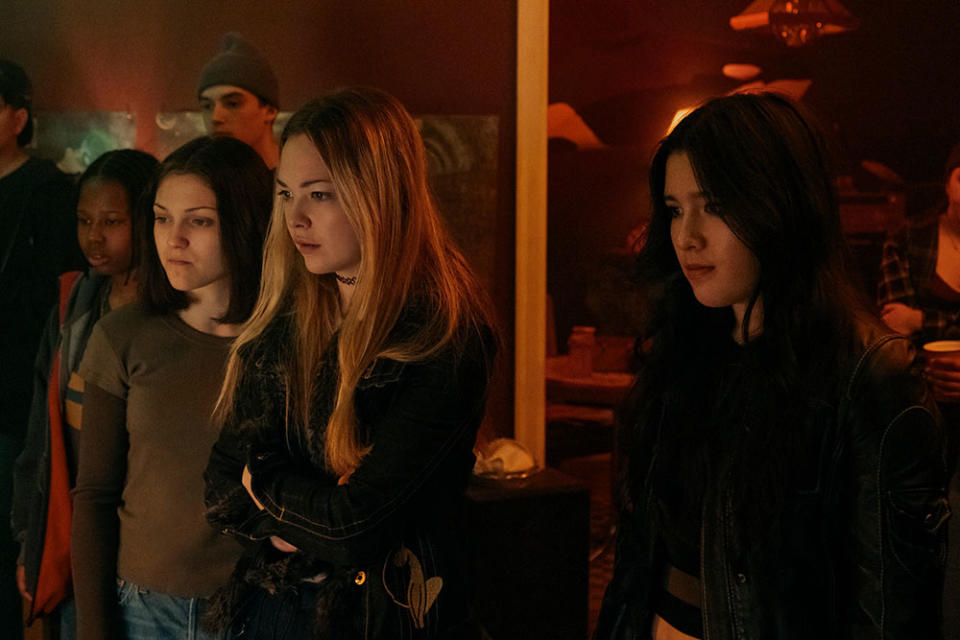
What do you think the message of Under the Bridge is for audiences?
I don’t think there’s one message. I think it’s the experience of looking at an incident through many perspectives. But for me with film and television, empathy is always the goal, to humanize people. I don’t think there is one takeaway. It’s an experience that is complicated, honestly. I really hope that Reena’s life is honored. She’s such a developed human being and character in the show, and with whatever people take away from the story, I hope that empathy is created in her life and her story is honored.
Race wasn’t as addressed in the real-life case, but Under the Bridge makes it a purpose to raise questions about if this was racially motivated. As a producer, what were those conversations like to include that in the show?
There were incidents and things that happened, things that were mentioned from the court case, that were racist. And so I think it would be really weird not to mention those things. I think that maybe back in the ’90s, racism wasn’t addressed in the same way and was sort of shoved under the rug. The way that we’re handling — you would hope — these things now, in 2024, are a little bit different. So, things that maybe weren’t viewed as racist somehow — I don’t know how — during the case, are obviously racist through the lens of anyone living currently.
You and Lily have been regarded as bringing humanity to true crime and stripping away the sensationalizing that usually comes with these types of projects. What was it like bringing the story to life without those negative aspects of true crime?
Nobody involved was interested in that, so that was the tone. No one was interested in sensationalizing and making just a shocking, horrible story. I think we all went into it knowing the goal was to tell a complicated story. A lot of the conversations we were constantly having were about our thoughts. There were a lot of interesting conversations behind the scenes about, “If we write a scene this way, it’s going to represent this. Do we want to say that?” or “If we write the scene this way, it’s going to say we’re saying this.” So, it was very tricky to be a little bit unbiased and just tell the story, because everything felt like a statement, in a sense. We all were on the same page, so that was the most helpful.
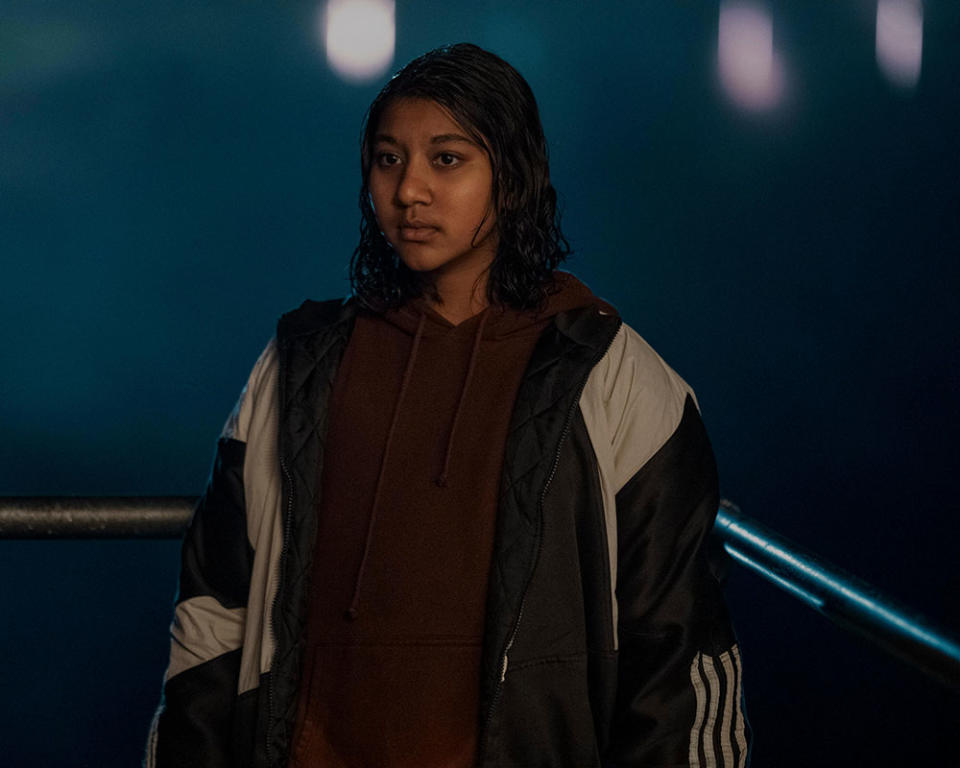
With shows and films that focus on a tragic event, it can be common for families to criticize the project as exploiting victims’ stories and re-traumatizing their loved ones. What was your approach in telling Reena’s story while also trying to respect that?
Anytime you’re telling anyone’s story, it’s going to upset some people, and I’m familiar with this. I come from a family where people are constantly telling our stories, and although it’s very different, it opens a conversation of who’s allowed to tell whose story. Whose choice is that? And, it is complicated. But I think that if you’re going to do it, the way to do it is by being as respectful as you can be, and learning as much as you can about the subject and the people and knowing as much information as you can possibly know and then telling your story. It really goes into the exploitation of filmmaking, in general. People go into communities or into other parts of the world and tell stories and extract, and there’s a way to do things that shouldn’t be the way anymore. I think that if you’re going to do them, you have to be really mindful and careful and thoughtful. It’s definitely complicated.
How do you reconcile with the fact that Kelly Ellard initially only got five years while Warren got life in prison for allegedly doing less than she did. How did that speak to the justice system in Canada at the time and how does that play into today?
Oh, my gosh. Look, bias always does have a play. That’s a huge issue. I don’t want to go into the nitty-gritty of how the trial was handled, because I’m not the best person to analyze the trial. But I think that, certainly, they had very different backgrounds. They had very different resources, and I think that a lot of ending up in prison versus not, or the time served, has to do with resources. That’s just how it is.
All episodes of Under the Bridge are now available to stream on Hulu.
Best of The Hollywood Reporter

